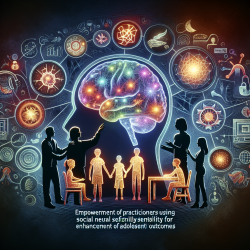Introduction
In the ever-evolving field of speech-language pathology, understanding the multifaceted influences on adolescent behavior is crucial. A recent study titled "Social neural sensitivity as a susceptibility marker to family context in predicting adolescent externalizing behavior" provides valuable insights that can enhance our practice and outcomes for children. This research underscores the importance of social neural sensitivity and its interaction with family contexts in predicting adolescent externalizing behaviors.
Understanding the Research
The study explores how individual differences in brain function, particularly in the ventral striatum and amygdala, influence adolescents' susceptibility to family environments. It was found that adolescents with heightened neural responses to social rewards and punishments were more susceptible to family conflict, which in turn predicted higher levels of externalizing behavior.
Externalizing behaviors, such as aggression and rule-breaking, are often influenced by family dynamics. However, not all adolescents are equally affected. This study highlights that those with increased social neural sensitivity are more likely to exhibit externalizing behaviors in negative family contexts.
Practical Implications for Practitioners
For practitioners, this research offers several actionable insights:
- Assessment of Neural Sensitivity: Consider incorporating assessments of social neural sensitivity into your practice. Understanding a child's neural response to social stimuli can help identify those at greater risk of externalizing behaviors.
- Family-Centric Interventions: Design interventions that address family dynamics. For adolescents with high neural sensitivity, improving family interactions can significantly reduce externalizing behaviors.
- Targeted Support: Provide targeted support for adolescents identified as highly sensitive to social rewards and punishments. Tailored interventions can help mitigate the negative impact of family conflict.
Encouraging Further Research
While this study provides a strong foundation, further research is essential to deepen our understanding. Practitioners are encouraged to explore the following areas:
- Longitudinal Studies: Conduct longitudinal studies to assess the long-term impact of social neural sensitivity on adolescent behavior.
- Broader Contexts: Investigate how other social contexts, such as peer interactions, influence adolescents with high neural sensitivity.
- Intervention Efficacy: Study the effectiveness of specific interventions designed for adolescents with heightened social neural sensitivity.
Conclusion
Understanding the interplay between social neural sensitivity and family context is vital for creating effective interventions for adolescents. By leveraging these insights, practitioners can enhance their ability to support children and foster positive developmental outcomes.
To read the original research paper, please follow this link: Social neural sensitivity as a susceptibility marker to family context in predicting adolescent externalizing behavior.










